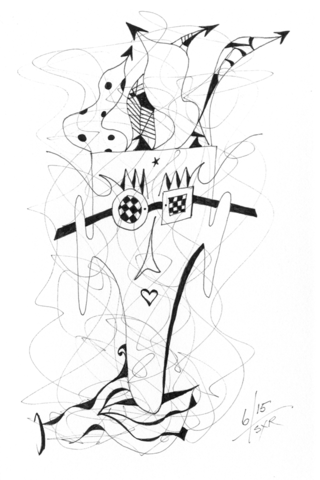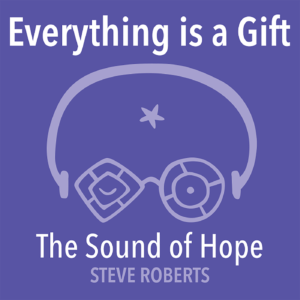I was recently initiated into that exclusive club: “By Far The Worst Pain I’ve Ever Experienced Or Ever Hope To.” A few kidney stones had decided it was time leave the mother ship. I’m told some women say it’s the equivalent of childbirth. Perhaps the biggest gift of this assault (after the sweet kiss of lightning drugs) is its impact on my struggle with violence. Awakened is a new depth of reality: I would never want to inflict on another the pain of my recent trips to the ER. And that’s not always been the case.
I’m not a murderer in this life, nor is physical force my default tool for navigating the world, but its propensity, its vibration, is an intimate, familiar presence in my being from incarnations past. Going by my father and his father, as well as my mother, I chose in this life a genetic lineage that included its fair share of rigidity, rage, control, and unpredictable violence. That imprint is one of my sacred teachers, something I’ve needed to embrace and free. My wife, my dearest friend for more than 40 years, who has never come close to threatening me physically, and who regularly touches me lovingly––even she finds there are still occasions when, reaching her hand to my cheek, I flinch.
Somewhere years ago I read a story about the warrior leader of a tribe renown for its violence. The warrior one day encounters a holy man on a path and demands that the holy man stand aside. The holy man refuses. The warrior draws his sword, places the point at the holy man’s belly, and says, “Do you realize I can put my sword right through you as I have done to many others?” The holy man replies, “Do you realize I can stand here and let you put your sword right through me?” The warrior realizes he has just met a greater warrior than he, and so renounces violence and commits himself and his tribe to the holy man’s even more rigorous path of peace. When I read this I felt I must have had a similar epiphany in a recent incarnation, recent because in this life, while I have known from the get-go that my purpose was oneness with all that is, I was still very much working out the enormity of what that required. I would love to know the journey of that warrior after his encounter with the holy man. I may no longer brutalize in the flesh as a matter of course, but I can’t say it will never happen, since I do it so easily in fantasy. It’s a powerful motivator to work the practices that lead to a peaceful heart. I’m a smart, articulate, good-looking, white guy with a nice voice and easy laugh, and there are times I’ve used every ounce of it as a weapon. When my 18 year old grandson, Sam, was about 10 or 12, he said to me, “Buck, you can be a little intense.” I am passionate to be someone around whom Sam never needs to feel apprehensive, and, by example, to help him become a grounded, loving presence in the face of anyone’s intensity. It’s among the more valuable services we humans can offer one another, and among the more difficult to master, at least for me.
At 20, I got myself discharged from the Army (where I was in training to be a Green Beret) for “failure to adapt to military life,” an act that, for years, I didn’t quite appreciate the genesis of until I read Tim O’Brien’s 1990 novel, “The Things They Carried,” a fictionalized account of the platoon O’Brien was part of in Vietnam. One story is of Mary Anne Bell, girlfriend of platoon-mate Mark Fossie. When she arrives in Vietnam to visit Fossie, she’s a sweet, innocent cheerleader type from Cleveland Heights, Ohio. But instead of returning home, she stays, drawn into what can be for some the intoxicating magnetism of war, a life against which just about all other life pales. Little by little she comes to look and act more like a soldier. Then she accompanies Green Berets on their missions. Then, finally, she walks into the jungle and disappears, presumably joining those warriors who abandon their formal military ties and operate in the belly of blistering chaos with only fellow ghosts their external compass. Reading this story I knew that had I gone to Vietnam, that would have been me. It was so familiar. Arguments about patriotism or stopping the spread of Communism, or even killing so-called bad guys, were window dressing, mind chatter, as meaningful as drill sergeants screaming in basic training. In me, deeper than thought, was an ancient craving for war at its most elemental: luscious, unfiltered fear needing to be managed, the awakening of senses and calculations essential to survival only in this landscape, the willingness to die, the beauty of ferocity and comradeship. I, too, would have chosen to disappear. Had I somehow survived, made it home, and was alive today, the war would have been my entire life, as it is for so many vets. The result, however, would not have honored the call of this incarnation: to forego perpetuating that strain of my genetic heritage as an essential step in growing my capacity to love. I must have known this subconsciously. My intuition, my inner guidance, the thread that ties us to eternal wisdom, my guardian angels if you will, led me to make a choice in keeping with my commitment to expand, rather than hunker down in the ephemeral comfort of a long-held addiction.
That was 50 plus years ago, and if I had died just about anytime between then and now I wouldn’t be able to tell this story, since it exists only with the benefit of seasoned hindsight. And, amusingly, that hindsight includes the delightful certainty that, should the telling take place again 50 years from now, when I’m 123, almost assuredly it will be different. Let’s hope deeper, more useful. I know nothing; I have only my best sense of things in the moment. That realization is among this life’s greatest blessings, exceeded only by the rewards of remembering it in more moments.
That said, my travels on the rocky road we all share leave me partial to the idea that most, if not all, forms of violence are a manifestation of beliefs strongly held. And if there is one belief that encompasses all others, one that, perhaps no matter how lightly or tightly it is held, underlies all violence, it is that there is an us and them: a light and a dark, a right and a wrong, a worthy and an unworthy, a superior and an inferior, ad infinitum. Further, such distinctions, we believe, are not just ways our ego attempts to ignore our heart’s call to love in all weather, they are not sacred distractions, myths of duality, that we must recognize and transcend in order to expand our consciousness to the point of living in the lap of God––no, we consider them, we believe them to be, The Truth. From this belief it’s okay for those who aren’t us to suffer. Every act of violence offers the same sacred gift: the opportunity to reflect on the price we pay for the belief that we are somehow separate from the rest of humanity.
From that reflection, I find in me an eagerness to experience whatever will cut through the illusion of separation, whatever will heighten my sensitivity to all I have in common with my fellows. Which is why I celebrate, albeit gingerly in certain moments, the unprecedented agony of passing kidney stones. By not wishing that pain on another soul, I’m growing my solidarity with whoever you are.





And I’m happy to have your solidarity. Happy to recognize in me the violence you recognize in you, and happy for the extent to which my own violent imaginings have remained and will remain imagined.
Thanks for lending your experience to strengthen my surrender to unity.